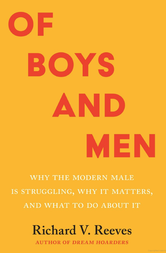A WRITER'S WIT |
My Book World

Reeves’s thesis may be that while the liberation of women in the last fifty years has been a much-needed, even transformative, change in our society, men and boys have been left behind in their liberation or growth. He believes, for example, that boys should be red-shirted, in other words, begin school a year later. Many parents already do this when they see their sons are not ready. An added benefit is that when the boys reach their teen years, they’re in a class of young women whose maturity more closely matches their own. Reeves also includes in his research how black boys and men differ yet from white males and other ethnic groups in their experiences—thus expanding his work.
To solve the employment problem of boys and men he advocates more sophisticated tech programs to train boys (as well as girls) for tech jobs that are sorely needed, perhaps entire high schools, not just a single department. He suggests that we as a society make it acceptable for men to train for more HEAL professions (health, education, administration, and literacy), in the same way women and girls have increased their presence in STEM professions (science, technology, engineering, and mathematics). In the manner that women have made headway in achieving fifty percent occupation of STEM jobs and professions that used to be closed to women, men and boys should be encouraged and supported financially to enter HEAL professions. He cites research that suggests many boys perform better when they are tutored by male teachers.
There are those who will see this book as overlooking women and girls, but Reeves insists that that is not so. An apparent feminist in thought and deed (a somewhat stay-at-home-dad), he believes that progress should continue for women and girls. It’s just that he believes men, because of societal changes occurring in the last half-century, should be allowed to grow in areas that they weren’t previously. And he offers an entire chapter on how these new roles for men may be accomplished. The task will take considerable resources, both financial and human, but if we don’t begin by considering the ideas put forth by our scholars, where else can we begin, and how do we expect to progress as a civilization?
Coming Next:
TUES: A Writer's Wit | Margaret Hill McCarter
WEDS: A Writer's Wit | Reza Aslan
THURS: A Writer's Wit | Anna Olson
FRI: My Book World | Andrew Sean Greer, Less Is Lost























 RSS Feed
RSS Feed